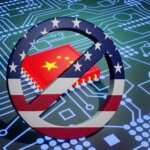South Korea is the latest country to step away from China

There are signs that US pressure on China’s semiconductor industry is increasing, as South Korea makes moves to align its interests with Japan and America. South Korea is a former trade partner of China’s, so if it changes its semiconducter allegiance, it will significantly accelerate China’s marginalization from the rest of the world’s semiconductor supply chain.
On March 16th, South Korean President Yoon Suk-yeol will visit Japan for two days. The visit comes in the wake of Seouls’s announcement that it plans to resolve the long-running dispute with Tokyo over wartime forced labor. This will be the first meeting between the powers in 12 years.
Yoon is expected to convince Tokyo to drop export controls on chip-making materials to South Korea and align their positions on supply chains. According to Park Ki-soon, a senior adviser and expert in China’s economy at Seoul-based law firm Dentons Lee, the two nations’ reconciliation will accelerate the process of cutting China out of the production of advanced chips – and out of the global supply chains that would allow them to import shose chips.
“Global semiconductor production is dominated by countries like South Korea, Japan, the United States, the Netherlands and Taiwan,” Park said. “The semiconductor supply chain of this bloc will become more stable, while China will be isolated.”
These developments all come as part of a US campaign of pressure on China’s semiconductor industry. In August last year, President Biden signed into law the CHIPs and Science Act to boost Americas hi-tech manufacturing capabilities. Following this, in October, updates were implemented to restrict China’s ability to obtain advanced chips.
South Korea is already in the US government-backed Chip 4 alliance that includes Japan and Taiwan. Beijing has criticized the alliance, which held its first meeting last month, as Washington’s plot to exclude China from semiconductor supply chains – arguably accurately.
China’s semiconductor industry already hit by the Netherlands
The US has reportedly secured an agreement with the Netherlands and Japan to restrict exports of some advanced chip-making machinery to China. No official details of the pact have emerged but the Dutch government recently announced that restrictions on exports of semiconductor technology will come into force before summer. Japan has been less overtly supportive, but the addition of South Korea to the equation may well alter the geopolitical math and firm up its support of the US-driven action.
The position of South Korea is particularly important for China, because it’s key to Beijing’s semiconductor self-sufficiency. “If South Korea-Japan relations are normalized, it would significantly help [Korea’s] imports of semiconductor material, components and equipment,” said Kim Dae-jong, a business professor at Sejong University in Seoul. “That [trade] can recover to pre-2019 levels.”
Even so, breaking from China would cause huge losses for South Korea, as a full 20% of the country’s exports consist of chips. Of that, 60% of chip exports from South Korea currently go to China. This means that if the country goes ahead with cutting ties from China, it stands to lose up to $US37.89 billion.
It may just be worth remembering that it may take years for the US to turn its plans to bolster its domestic semiconductor production into the reality of plants on the ground, and in the meantime, the US itself may need a reliable source of non-Chinese chips – especially to supply all the US-based firms that are being enticed to cut ties with China themselves.
Seoul is seeking a way for Samsung and SK Hynix to retain their semiconductor facilities in China, which might be made tricky by its relations with Japan and the US. In fact, next month Yoon is going to visit America, where he’ll meet with President Biden at the White House for a bilateral summit that is expected to include discussions on security and economic ties between the two companies.









